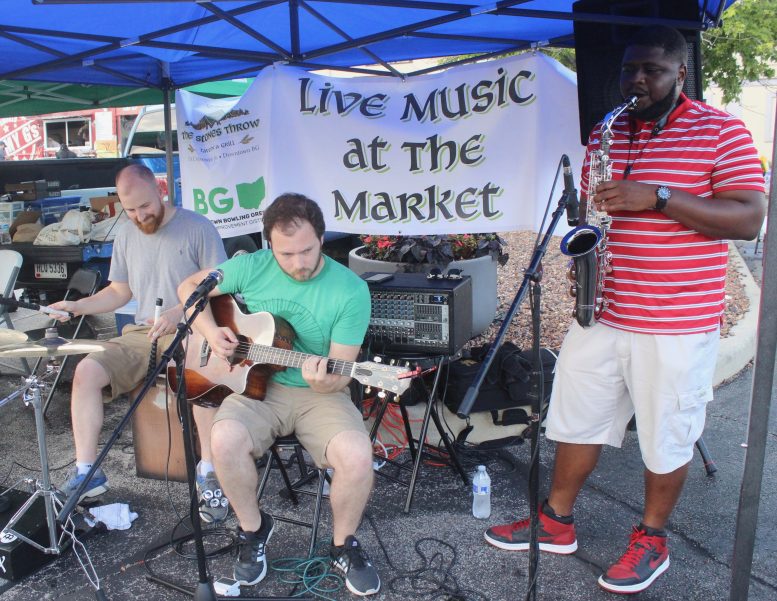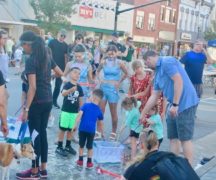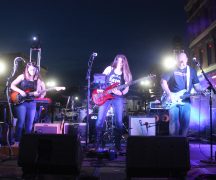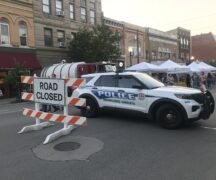By DAVID DUPONT
BG Independent News
The music at Friday’s Firefly Nights tonight (July 19) welcomes another insect-named entity, Moths in the Attic, to help brighten evening.
The alternative folk rock trio will take the stage in the beer garden located on the northwest corner of West Wooster and Church Street at 6 p.m. for a half hour set.
Moths in the Attic is the latest musical venture of songwriter Zack Fletcher. The native of Bowling Green said he was interested in playing this new hometown festival, but wasn’t sure it would work out since Moths has a regular Friday night gig at Logan’s Irish Pub in Findlay.
But organizers tucked Moths in as opener.
Fletcher, 31, has been on the local music scene since he had a band in junior high.
Fletcher started playing guitar at 11 after pestering his parents to get him a guitar. They relented on his 11th birthday. He set down roots in the Bowling Green club scene by taking lessons at BG Music & Sound from Al Foreman of Sledge, one of the top area bands.
As soon as Fletcher had learned a few chords he started writing songs.
As guitarist in junior high jazz ensemble, he asked the director Bruce Corrigan if his band could play a number on a school concert. Corrigan agreed.
His highest profile band was Flaming Hot Marbles, a rock outfit that released albums in 2009 and 2014 and vied for a vinyl record release through Feedbands. Though they didn’t get the prize the competition did drive some traffic and provided good feedback.
During those days, Fletcher was already writing the material for what would become Moths in the Attic.
The songs were more folk oriented than the classic rock-influenced work of Flaming Hot Marbles. He played these songs when he did solo gigs.
Looking for collaborators to flesh out his original work he turned to Kevin Jorrey on percussion and Michael Williams on saxophone. Each brings another world of influences to the band. Jorrey is principally a heavy metal drummer, though with Moths has plays on a smaller kits to add percussive color. Williams first got into music through the gospel sounds he heard in church. His saxophone can add atmosphere or take the lead. Or it can serve as a harmony voice. When the band plays covers on longer gigs, Williams is able to pull out the highlights of the originals, to flesh out the song.
While Flaming Hot Marbles was a collective effort, Fletcher considers Moths “my baby because it’s all my original songs that I present. … This one I’m more emotionally connected to. It’s my experience.”
The name comes from a poem Fletcher wrote.
“The idea is that moths in an attic may enjoy the comfort of an enclosed dark space,” he explained, “but ultimately they need to be free in order to thrive and survive. The same is true for these songs and the ideas in them… the moths being the songs and the attic being where I keep them to myself. Playing them sets them free.”
Even though alternative folk rock seems to fit best, listeners often wonder what niche the Moths fit into.The saxophone, Fletcher said, seems to throw them off, adding a jazzy edge to the sound. Fletcher also mixes blues and classical influences.
Fletcher has his own favorite acts — Radiohead, Bon Iver, and Nick Drake.
He added: “I’m always listening to new stuff. Sometimes I don’t even want to listen to something I’ve heard before. I’m always searching.”
While he’s always has new material in the works, of late, he’s been busy pulling together the first recording projects to capture the Moths in the Attic sound. One is a studio album with an expanded cast, and the other that will document the band’s live show.
He’s not sure either will be out in time for the Black Swamp Arts Festival when Moths in the Attic will open the Sunday (Sept. 8) show on the Main Stage.
Once it’s done, he’ll turn his attention to a pile of unfinished work that he wants to polish and get to see the light of day.
Fletcher said that performing at the Black Swamp Festival’s Main Stage is “a rite of passage for local performers.”
He’s played on other stages at the festival for the past decade, starting with a solo set on the Community Stage and including after hours gigs.
He remembers as a kid coming to the festival with his grandparents and cousins. He’d always be able to pick out some less expensive item from one of the vendors. When he was a teenager it was “a very social event.”
“It’s a real a celebration of everything Bowling Green represents. It has a special place in my heart.”





